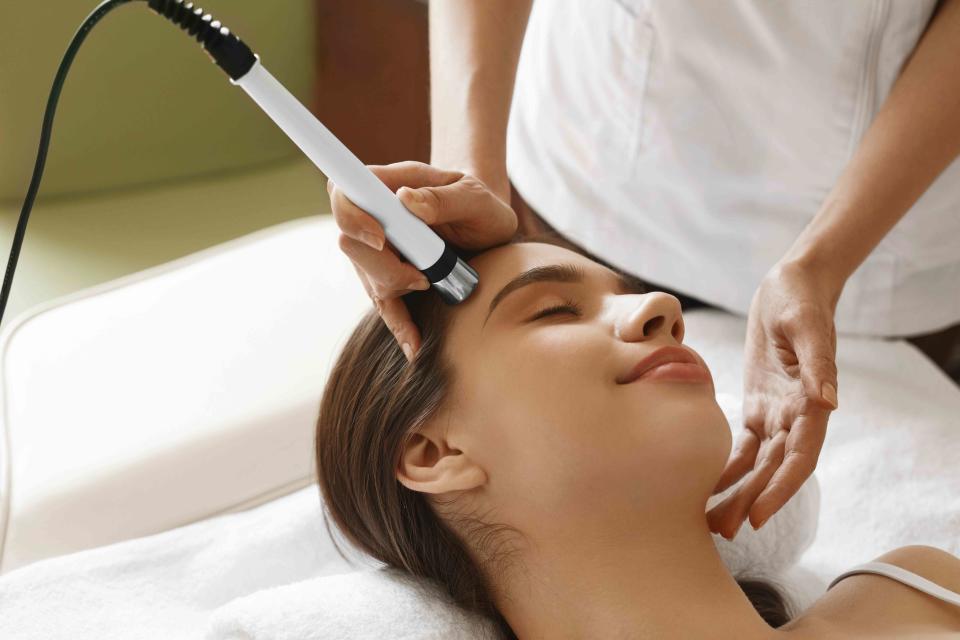Everything You Need to Know About Microdermabrasion for Smoother Skin
Experts answer common questions about this resurfacing skin care treatment.

Puhhha/Getty Images
Rough texture and an uneven complexion are two of the biggest complaints people have when it comes to their skin, and microdermabrasion is a treatment that can target both in one fell swoop. This minimally invasive process involves sloughing away dead skin cells with a special device—often wielded by a professional—that leaves skin looking smooth and bright. Here’s everything you need to know.
RELATED: How Often Should You Get a Facial? We Asked Experts
What Is Microdermabrasian?
Microdermabrasion is a non-surgical, gentle treatment in which a mildly abrasive device exfoliates the top layer of skin to remove dead skin cells. After one treatment skin has a smoother and more luminous appearance, and with ongoing treatments you can see an improvement in overall tone.
“This type of skin rejuvenation is used to treat light scarring, discoloration, sun damage, and can help improve the work of other topical medications to improve skin health,” says Maya Thosani, MD, a board-certified dermatologist based in Scottsdale, Ariz. “It can renew overall skin tone and texture, and improves the appearance of skin affected by sun exposure, wrinkles, acne, and other conditions.”
Benefits of Microdermabrasion
Instantly creates a smoother-feeling complexion
Makes skin look more glowy
Targets uneven tone, including sun spots and acne-related hyperpigmentation
Helps boost skin cell turnover
Unclogs pores for those prone to acne
Allows other products to absorb more deeply to improve efficacy
Minimizes the look of fine lines and wrinkles
It offers almost immediate results, making it a great option about a week before a big event, and also has cumulative results when you get the treatment performed regularly.
3 Types of Microdermabrasian
The treatment is typically performed on the face, though you can also have it performed on other parts of the body. You’ll also come across a few different types of microdermabrasion:
Diamond Tip: This method of microdermabrasion uses a diamond-tipped wand to gently remove and vacuum the excess dead skin. It’s sort of like using a very, very fine-grit sandpaper.
Crystal Microdermabrasion: “The crystal microdermabrasion shoots tiny crystals through a tube which removes the dead skin cells,” Dr. Thosani explains. “Meanwhile, the vacuum portion suctions off the dead skin, debris, and crystals—like a form of sandblasting.”
Hydradermabrasion: Hydradermabrasion combines exfoliation with hydration. At the same time the device removes dead skin cells, a hydrating serum is infused into the skin.
Who Should Get Microdermabrasion?
If your end-goal is to get smooth, glowy, and healthy-looking skin, then microdermabrasion is a great option. Dr. Thosani adds that it’s also ideal for those who want to address hyperpigmentation, discoloration, fine lines, wrinkles, and mild acne scars. “The goal is to soften shallow lines and wrinkles, clear clogged pores, and even out the complexion when used in combination with other topical therapies,” she says.
Who Shouldn't Get Microdermabrasian?
Not everyone is a candidate for microdermabrasion, particularly those with sensitive or reactive skin. “Those who suffer from irritation or inflammatory skin conditions such as psoriasis, rosacea, or eczema should avoid microdermabrasion unless specifically directed otherwise by a medical professional,” notes Dendy Engelman, MD, FACMS, FAAD, a board-certified cosmetic dermatologist in New York City. “The procedure can potentially exacerbate these conditions.”
How Much Does Microdermabrasion Cost?
Expect to pay between $100 and $500 dollars for microdermabrasion. Dr. Engelamn says that the cost ultimately depends on factors like who’s doing the treatment, where you live, and the type of microdermabrasion. The price can also vary depending on what area you’re treating and whether you choose to have additional services.
Can You Do Microdermabrasion at Home?
Not feeling the price tag of a professional microdermabrasion treatment? Though the results may not be quite as dramatic, you can use at-home devices that work similarly. The Personal Microderm Elite Pro ($239, PMD Beauty) and Lancer Pro Polish Microdermabrasion Device ($200, Lancer Skincare) are two examples of professional-style tools you can use at home. Both of the derms we spoke to stressed the importance of following hygiene protocol and directions when using these devices.
Post-Care Advice for Microdermabrasian
After a microdermabrasion treatment, Dr. Thosani says you’ll want to avoid other exfoliating or harsh products for at least the first three days. These can irritate or strip the skin, negatively affecting the skin barrier. You may also deal with some irritation, redness, or even peeling or itchiness post-treatment. A hands-off approach is best. Instead, apply gentle and hydrating toners, serums, and moisturizers for relief and to maintain your glow.
For more Real Simple news, make sure to sign up for our newsletter!
Read the original article on Real Simple.

 Yahoo Sport
Yahoo Sport 




































































